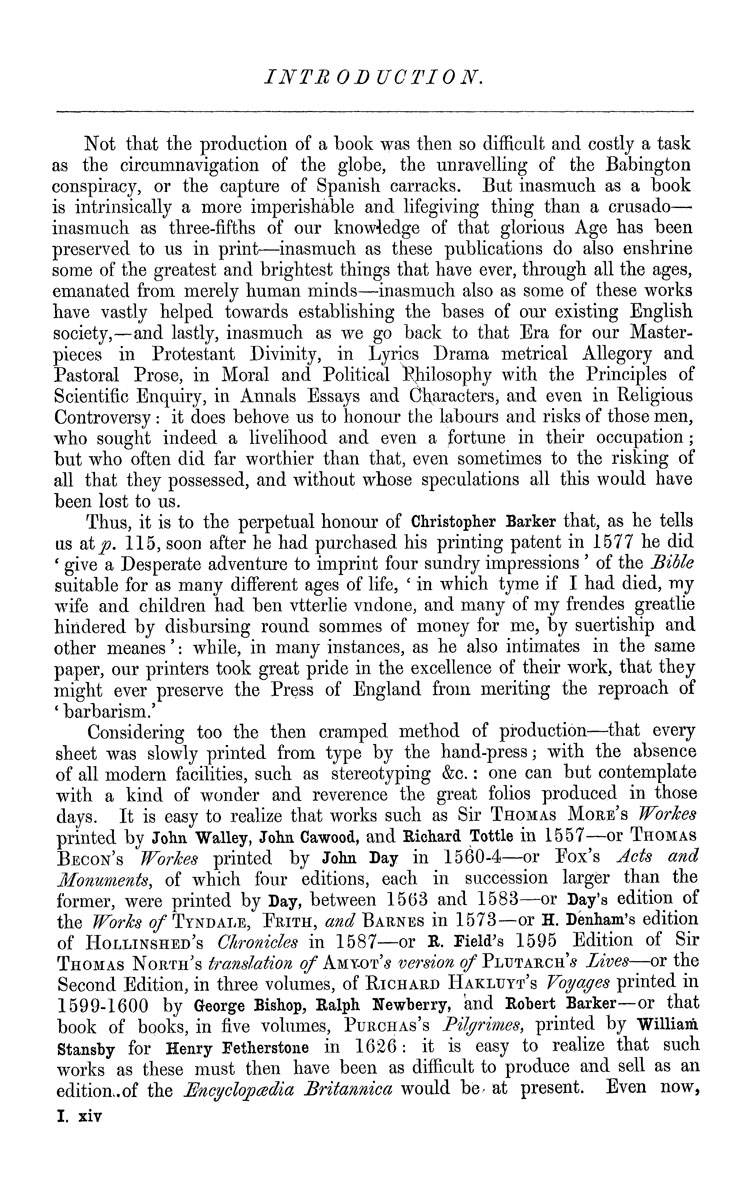INTBODUCTION.
Not that the production of a book was then so difficult and costly a task
as the circumnavigation of the globe, the unravelling of the Babington
conspiracy, or the captare of Spanish carracks. But inasmuch as a book
is intrinsically a more imperishable and lifegiving thing than a crusado-—
inasmuch as three-fifths of our knowledge of that glorious Age has been
preserved to us in print—inasmuch as these publications do also enshrine
some of the greatest and brightest things that have ever, through all the ages,
emanated from merely human minds—inasmuch also as some of these works
have vastly helped towards establishing the bases of our existing English
society,—and lastly, inasmuch as we go back to that Era for our Master¬
pieces in Protestant Divinity, in Lyrics Drama metrical Allegory and
Pastoral Prose, in Moral and Political iRhilosophy with the Principles of
Scientific Enquiry, in Annals Essays and Cliaracters, and even in Religious
Controversy : it does behove us to honour the labours and risks of those men,
who sought indeed a livelihood and even a fortune in their occupation;
but who often did far worthier than that, even sometimes to the risking of
all that they possessed, and without whose speculations all this would have
been lost to us.
Thus, it is to the perpetual honour of Christopher Barker that, as he tells
as at/>. 115, soon after he had pm^chased his printing patent in 1677 he did
' give a Desperate adventure to imprint four sundry impressions ' of the Bible
suitable for as many different ages of life, ' in which tyme if I had died, my
wife and children had ben vtterlie vndone, and many of my frendes greatlie
hindered by disbursing round sommes of money for me, by suertiship and
other meanes': while, in many instances, as he also intimates in the same
paper, our printers took great pride in the excellence of their work, that they
might ever preserve the Press of England from meriting the reproach of
* barbarism.'
Considering too the then cramped method of production—that every
sheet was slowly printed from type by the hand-press; with the absence
of all modern facilities, such as stereotyping &c.: one can but contemplate
with a kind of wonder and reverence the great folios produced in those
days. It is easy to realize that works such as Sir Thomas More's Workes
printed by John WaUey, John Cawood, and Uichard Tottle in 1557—or Thomas
Becon's Workes printed by John Day in 1560-4—or Pox's Acts and
Monuments, of which four editions, each in succession larger than the
former, were printed by Day, between 1563 and 1583—or Day's edition of
the Works (/Tyndale, Erith, and Barnes in 1573—or H. Denham's edition
of Hollinshed's Chronicles in 1587—or E. Field^s 1595 Edition of Sir
Thomas North's translation of Amyot'^^ version of Plutarch'.^ Lives—-oy the
Second Edition, in three volumes, of Richard Hakluyt's Voyages printed in
1599-1600 by George Bishop, Ralph dewberry, and Robert Barker—or that
book of books, in five volumes, Purchas's Bilgrimes, printed by Williani
Stansby for Henry Fetherstone in 1626: it is easy to realize that such
works as these must then have been as difficult to produce and sell as an
edition,of the Encyclopcedia Britannica would be. at present. Even now,
I. xiv
|








